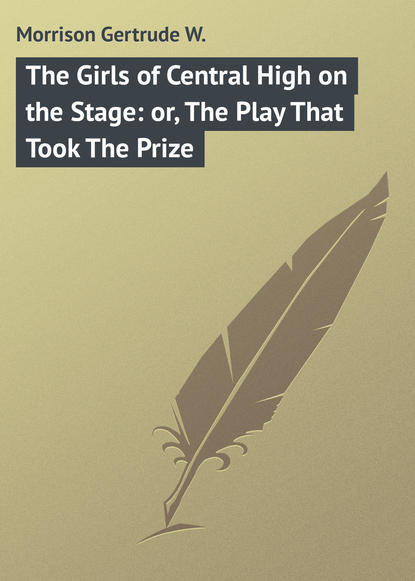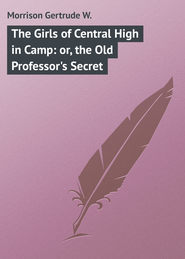По всем вопросам обращайтесь на: info@litportal.ru
(©) 2003-2024.
✖
The Girls of Central High on the Stage: or, The Play That Took The Prize
Настройки чтения
Размер шрифта
Высота строк
Поля
“And if Mr. Closewick shouldn’t want to – to trust us any longer, Mother?” suggested Jess. That was as near as she could get to telling the good lady what had really happened the night before.
“Why! that would be most mortifying. He won’t do it, though. But if he does, we’ll immediately begin trading elsewhere, I don’t really think Mr. Closewick always gives us good weight, at that!”
Jess could only sigh. It was always the way. Mrs. Morse saw things from a most surprising angle. She was just as honest – intentionally – as she could be, but the ethics of business dealing were not quite straight in her mind.
And something must be done this very day to put food in the larder. What little Jess had brought in from Mr. Vandergriff’s store would not last them over Sunday. And her mother seemed to think that everybody else would be just as sanguine of her getting a check as she was herself.
“I do wish you had been able to get steady work with the Courier,” spoke Jess, as she prepared to go out.
“That would have been nice,” admitted her mother. “And I am in a position to know a good deal of what goes on socially on the Hill. I am welcome in the homes of the very best people, for your father’s sake, Jess. He was a very fine man, indeed.”
“And for your own sake, too, Mamma!” cried Jess, who was really, after all, very proud of her mother’s talent.
“It would have been nice,” repeated Mrs. Morse. “And certainly the Courier is not covering the Hill as well as might be. I pointed that out to Mr. Prentice; but he is limited in expenditures, I suppose, the paper being a new venture.”
It was on the tip of the girl’s tongue to tell her mother of the visit of Mr. Prentice’s sister-in-law the evening before. But why disturb her mother’s mind with all that trouble? So she said nothing, kissed her fondly, and sallied forth to beard in their lairs “the butcher, the baker, and the candlestick maker.” And, truly, there were few girls in Centerport that day with greater lions in their way than those in the path of Jess Morse.
CHAPTER VII – THE HAND HELD OUT
When Jess came out of the house there was a group of her schoolmates – and not all of them boys – at the foot of the Whiffle Street hill. Being towed by Chet’s big kite had became a game that all hands wanted to try. But the sun was getting warmer and the icy street would soon be slushy and the skates would cut through.
“I’ve had enough,” said Bobby Hargrew, removing her skates when she spied Jess. “The policeman has warned us once, and he’ll be mad next time he comes around if we’re here still.”
“Better get your skates, Jess, and try it just once,” urged Chet Belding, who was very partial to his sister’s closet chum.
“I can’t, Chet,” replied Jess. “I must do my Saturday’s marketing.”
“Hullo! here’s Short and Long!” cried Bobby, as a very short boy with very brisk legs came sliding down the hill with a big bundle under his arm.
Billy Long was an industrious youngster who only allowed himself leisure to keep up in athletics after school hours, because he liked to earn something toward his family’s support.
“Stop and try a ride, Billy,” urged Lance Darby, holding the cord of the tugging kite.
“Can’t. Going on an errand.”
“Hey, Billy! how’s your dyspepsia?” demanded another of the boys.
Billy grinned. Bobby exclaimed:
“Now, don’t tell me that Short and Long ever has trouble with his digestion – I won’t believe it!”
“He sure had a bad case of it yesterday,” drawled Chet Belding. “At least, so Mr. Sharp said. Billy spelled it with an ‘i’.”
“Let me use your knife a minute, please?” asked Bobby, who was still struggling with a refractory strap. “No! just toss it to me.”
“That’s all right,” returned the small boy, with a grin, as he walked over and carefully handed Bobby the knife. “I don’t take any chances with girls in throwing, or catching. All my sister can do is to throw a fit, or catch a cold!”
“Ow! isn’t that a wicked statement?” cried Bobby. “You know it isn’t so. But you’re right down ignorant, Billy. You’re just as bad as Postscript was in Gee Gee’s class one day this week.”
“Who’s ‘Postscript’?” demanded Lance. “That’s a new one on me.”
“Why,” said Bobby, her black eyes twinkling, “I mean Adeline Moore. That’s a postscript, isn’t it?”
“What happened to Addie?” asked Jess, as the others laughed.
“Why, she got befuddled in reciting something about an Indian uprising that came in our American History hour. It’s all review stuff, you know.
“‘What is it that you call an Indian woman, Adeline?’ Gee Gee asked, real sharp.
“And Addie jumped, and stammered, and finally said:
“‘A squaw, please, Miss Carrington.’
“‘And what do you call her baby, then?’ snapped Gee Gee.
“‘A – a squawker,’ says Addie, and the poor thing got a black mark for it. Wasn’t that mean?”
“Miss Grace G. Carrington was in one of her moods,” observed Chet, when the laugh had subsided.
“She’s subject to moods,” Lance drawled.
“No, she’s not!” cried Bobby Hargrew. “She only had one mood – the imperative – and we girls are all subject to that,” and she sighed, for Bobby was frequently in trouble with the very strict assistant principal of Central High whom she disrespectfully referred to as “Gee Gee.”
Jess and her friend had left the others now and were approaching Market Street. Like everybody else on the walks, they had to be careful how they stepped, and it was with many a laugh and gibe that Bobby Hargrew beguiled the way. Jess, however, was serious once more.
“Are you really going in for that prize Mrs. Kerrick is going to put up for us?” demanded Bobby.
“Do you know what it’s for?”
“No – I haven’t heard that,” said the younger girl. “But for two hundred dollars I’d learn tatting – or darn socks. Daddy says I ought to learn to darn his. What’s it all about, anyway? I suppose Laura knows?”
“Yes. It’s a play. The girl who writes the best one, that can be acted by us boys and girls of Central High, is to get the prize.”
“Gee! won’t that be nuts for Miss Gould?” cried Bobby. “You know, she tried us out in blank verse the other day, and I made a hit. My stately lines were spoken of with commendation. And when she told us to bring in a rhyme, or poetry – whichever we had the courage to call it – I wanted to read mine out loud. But she wouldn’t let me. She said she had not intended to start a school for humorous poets.”
“What did you hand in?” asked Jess, smiling.
“Want to hear it?” cried Bobby, eagerly, digging into her pocket which – like a boy’s – was always filled with a conglomeration of articles. “Listen here!” she added, drawing forth a crumpled paper. “This is called ‘Such is Life’ and really, I was hurt that Miss Gould considered it so lightly,” and she began to read at once:
“‘William Wright was often wrong
And Thomas Goode was bad;
While Griffith Smiley, odd to state,
Was almost always sad.
Jedediah Rich was very poor,
While Ozias Poor was rich,
And Eliphalet Q. Carpenter
Earned his living digging ditch.
Tom White was black Jim Black was white,










